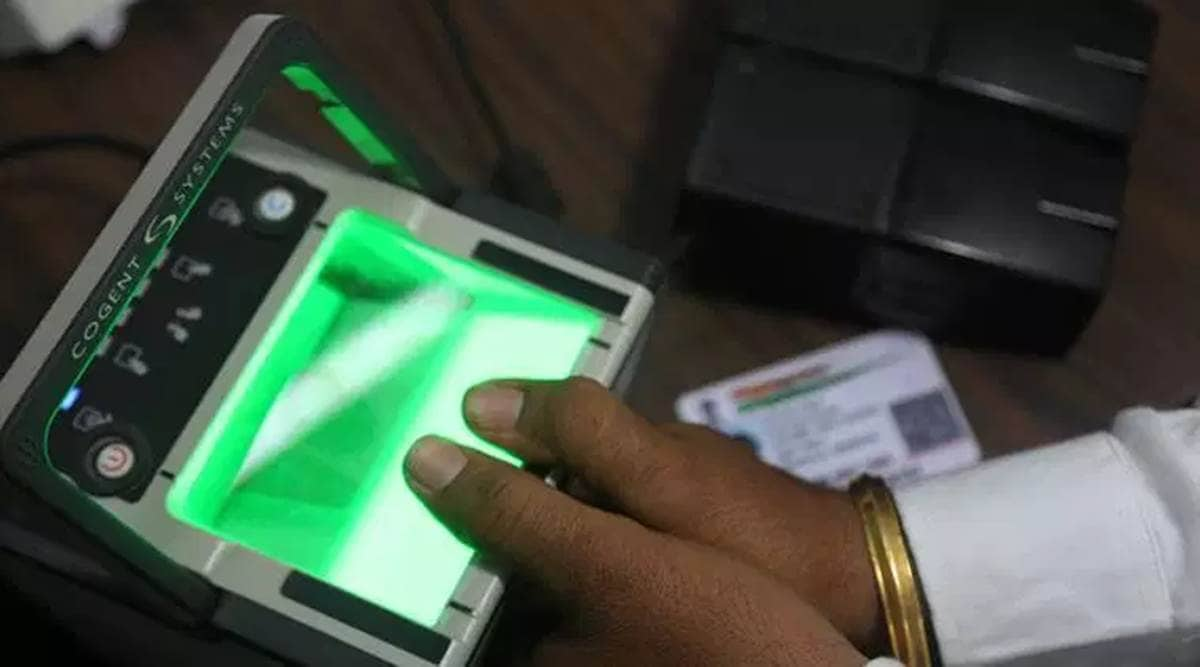 An official at the NHA told The Sunday Express that states have flagged concerns about the “security aspects of such a data transfer” and the possibility of Centre “using it for political gains”.
An official at the NHA told The Sunday Express that states have flagged concerns about the “security aspects of such a data transfer” and the possibility of Centre “using it for political gains”. Privacy concerns and reluctance among states over the sharing of Aadhaar details of National Food Security Act (NFSA) beneficiaries with the National Health Authority (NHA) notwithstanding, the Department of Food and Public Distribution has urged states and Union Territories to share NFSA ration card data and Aadhaar numbers with the NHA. States are learnt to have subsequently flagged concerns about the “security aspects of such a data transfer”.
The NHA’s initiative to map the Socio Economic and Caste Census (SECC) database with Aadhaar and the public distribution system database aims to identify beneficiaries of health insurance programme Ayushman Bharat Pradhan Mantri Jan Arogya Yojana (AB PM-JAY).
In a letter dated January 5, NHA CEO R S Sharma wrote to Department of Food and Public Distribution Secretary Sudhanshu Pandey: “…due to deficiencies in the SECC database, beneficiary identification (under AB PM-JAY) has become extremely difficult. In this regard, NHA has been trying different ways and means to enrich the SECC database, which can then be used to target beneficiaries. Possible mapping of SECC beneficiaries with Aadhaar and NFSA will help in the easy identification of beneficiaries.”
He said without mapping Aadhaar with the SECC database, it will be “extremely unlikely” to achieve Ayushman card saturation.
The exercise, the fear
The National Health Authority aims to identify beneficiaries of health insurance programme Ayushman Bharat Pradhan Mantri Jan Arogya Yojana. But states have concerns over security aspects, and are suspicious that it may be used for political gains.
Following Sharma’s letter, the Department of Food and Public Distribution’s Director (Public Distribution) Vivek Shukla is learnt to have written to states on January 6, requesting them for “necessary assistance and co-operation” in sharing beneficiary details.
An official at the NHA told The Sunday Express that states have flagged concerns about the “security aspects of such a data transfer” and the possibility of Centre “using it for political gains”.
It is also learnt that at a January 4 meeting with officials of the food department, the Unique Identification Authority of India (UIDAI) and IT ministry, the NHA had raised the issue.
“Due to the lack of clarity on whether Aadhaar information can be freely shared between the ministries or not, there has been reluctance on the part of state governments owning the NFSA beneficiary information to share the Aadhaar details with NHA. This was raised by the NHA at the meeting,” another government official said.
At the same meeting, it was discussed that existing UIDAI circulars allow ministries and departments to share Aadhaar and related data among themselves “for effective formulation of schemes and selection of beneficiaries”.
In October last year, the UIDAI had allowed sharing of Aadhaar details between different government departments under the Aadhaar (Targeted Delivery of Financial and Other Subsidies, Benefits and Services) Act, 2016.
The PM-JAY scheme, launched in 2018, aims to provide a health cover of Rs 5 lakh per family per year for secondary and tertiary care hospitalisation to over 10.74 crore poor and vulnerable families. The beneficiaries are to be decided based on the deprivation and occupational criteria of SECC 2011 for rural and urban areas respectively. The NHA is tasked with implementation of the PM-JAY scheme.
An official said the onus of ensuring compliance of various provisions and regulations of data protection, data storage, data privacy and seeking consent from Aadhaar holders will lie with the user departments — in this case the NHA.
“The NHA is planning to attain consent of beneficiaries through both online and offline modes, for example text messages or physical forms at ration shops,” the official said.
The NHA CEO, Department of Food and Public Distribution and UIDAI did not respond to queries seeking comments.
In October last year, the Niti Aayog called for the PM-JAY scheme to be extended to cover a section of people without health insurance, highlighting that at least 30 per cent of the population, or 40 crore individuals, called the ‘missing middle’, are devoid of any financial protection for health.
Among three models suggested to achieve this, the Niti Aayog recommended expanding the government-subsidised health insurance through the PM-JAY scheme to a wider set of beneficiaries.
“This is the only model out of three proposed which has fiscal implications for the Government. Though this model assures coverage of the poorer segments on the missing middle population, premature expansion of PM-JAY can overburden the scheme,” it noted in its report.
The report also suggested sharing of the government scheme data with private insurance companies. Government databases such as National Food Security Act (NFSA), Pradhan Mantri Suraksha Bima Yojana, or the Pradhan Mantri Kisan Samman Nidhi (PM-KISAN) for agricultural households can be shared with private insurers after taking consent from these households, the report said, suggesting an outreach strategy.
- The Indian Express website has been rated GREEN for its credibility and trustworthiness by Newsguard, a global service that rates news sources for their journalistic standards.

